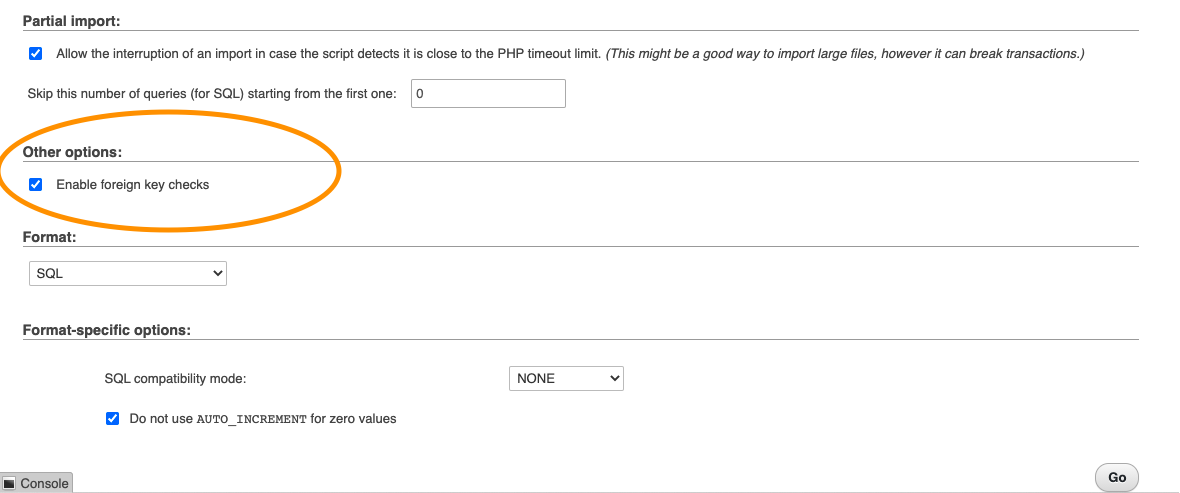So I'm trying to add Foreign Key constraints to my database as a project requirement and it worked the first time or two on different tables, but I have two tables on which I get an error when trying to add the Foreign Key Constraints. The error message that I get is:
ERROR 1215 (HY000): Cannot add foreign key constraint
This is the SQL I'm using to create the tables, the two offending tables are Patient and Appointment.
SET @OLD_UNIQUE_CHECKS=@@UNIQUE_CHECKS, UNIQUE_CHECKS=0;
SET @OLD_FOREIGN_KEY_CHECKS=@@FOREIGN_KEY_CHECKS, FOREIGN_KEY_CHECKS=1;
SET @OLD_SQL_MODE=@@SQL_MODE, SQL_MODE='TRADITIONAL,ALLOW_INVALID_DATES';
CREATE SCHEMA IF NOT EXISTS `doctorsoffice` DEFAULT CHARACTER SET utf8 ;
USE `doctorsoffice` ;
-- -----------------------------------------------------
-- Table `doctorsoffice`.`doctor`
-- -----------------------------------------------------
DROP TABLE IF EXISTS `doctorsoffice`.`doctor` ;
CREATE TABLE IF NOT EXISTS `doctorsoffice`.`doctor` (
`DoctorID` INT(11) NOT NULL AUTO_INCREMENT ,
`FName` VARCHAR(20) NULL DEFAULT NULL ,
`LName` VARCHAR(20) NULL DEFAULT NULL ,
`Gender` VARCHAR(1) NULL DEFAULT NULL ,
`Specialty` VARCHAR(40) NOT NULL DEFAULT 'General Practitioner' ,
UNIQUE INDEX `DoctorID` (`DoctorID` ASC) ,
PRIMARY KEY (`DoctorID`) )
ENGINE = InnoDB
DEFAULT CHARACTER SET = utf8;
-- -----------------------------------------------------
-- Table `doctorsoffice`.`medicalhistory`
-- -----------------------------------------------------
DROP TABLE IF EXISTS `doctorsoffice`.`medicalhistory` ;
CREATE TABLE IF NOT EXISTS `doctorsoffice`.`medicalhistory` (
`MedicalHistoryID` INT(11) NOT NULL AUTO_INCREMENT ,
`Allergies` TEXT NULL DEFAULT NULL ,
`Medications` TEXT NULL DEFAULT NULL ,
`ExistingConditions` TEXT NULL DEFAULT NULL ,
`Misc` TEXT NULL DEFAULT NULL ,
UNIQUE INDEX `MedicalHistoryID` (`MedicalHistoryID` ASC) ,
PRIMARY KEY (`MedicalHistoryID`) )
ENGINE = InnoDB
DEFAULT CHARACTER SET = utf8;
-- -----------------------------------------------------
-- Table `doctorsoffice`.`Patient`
-- -----------------------------------------------------
DROP TABLE IF EXISTS `doctorsoffice`.`Patient` ;
CREATE TABLE IF NOT EXISTS `doctorsoffice`.`Patient` (
`PatientID` INT unsigned NOT NULL AUTO_INCREMENT ,
`FName` VARCHAR(30) NULL ,
`LName` VARCHAR(45) NULL ,
`Gender` CHAR NULL ,
`DOB` DATE NULL ,
`SSN` DOUBLE NULL ,
`MedicalHistory` smallint(5) unsigned NOT NULL,
`PrimaryPhysician` smallint(5) unsigned NOT NULL,
PRIMARY KEY (`PatientID`) ,
UNIQUE INDEX `PatientID_UNIQUE` (`PatientID` ASC) ,
CONSTRAINT `FK_MedicalHistory`
FOREIGN KEY (`MEdicalHistory` )
REFERENCES `doctorsoffice`.`medicalhistory` (`MedicalHistoryID` )
ON DELETE CASCADE
ON UPDATE CASCADE,
CONSTRAINT `FK_PrimaryPhysician`
FOREIGN KEY (`PrimaryPhysician` )
REFERENCES `doctorsoffice`.`doctor` (`DoctorID` )
ON DELETE CASCADE
ON UPDATE CASCADE)
ENGINE = InnoDB;
-- -----------------------------------------------------
-- Table `doctorsoffice`.`Appointment`
-- -----------------------------------------------------
DROP TABLE IF EXISTS `doctorsoffice`.`Appointment` ;
CREATE TABLE IF NOT EXISTS `doctorsoffice`.`Appointment` (
`AppointmentID` smallint(5) unsigned NOT NULL AUTO_INCREMENT ,
`Date` DATE NULL ,
`Time` TIME NULL ,
`Patient` smallint(5) unsigned NOT NULL,
`Doctor` smallint(5) unsigned NOT NULL,
PRIMARY KEY (`AppointmentID`) ,
UNIQUE INDEX `AppointmentID_UNIQUE` (`AppointmentID` ASC) ,
CONSTRAINT `FK_Patient`
FOREIGN KEY (`Patient` )
REFERENCES `doctorsoffice`.`Patient` (`PatientID` )
ON DELETE CASCADE
ON UPDATE CASCADE,
CONSTRAINT `FK_Doctor`
FOREIGN KEY (`Doctor` )
REFERENCES `doctorsoffice`.`doctor` (`DoctorID` )
ON DELETE CASCADE
ON UPDATE CASCADE)
ENGINE = InnoDB;
-- -----------------------------------------------------
-- Table `doctorsoffice`.`InsuranceCompany`
-- -----------------------------------------------------
DROP TABLE IF EXISTS `doctorsoffice`.`InsuranceCompany` ;
CREATE TABLE IF NOT EXISTS `doctorsoffice`.`InsuranceCompany` (
`InsuranceID` smallint(5) NOT NULL AUTO_INCREMENT ,
`Name` VARCHAR(50) NULL ,
`Phone` DOUBLE NULL ,
PRIMARY KEY (`InsuranceID`) ,
UNIQUE INDEX `InsuranceID_UNIQUE` (`InsuranceID` ASC) )
ENGINE = InnoDB;
-- -----------------------------------------------------
-- Table `doctorsoffice`.`PatientInsurance`
-- -----------------------------------------------------
DROP TABLE IF EXISTS `doctorsoffice`.`PatientInsurance` ;
CREATE TABLE IF NOT EXISTS `doctorsoffice`.`PatientInsurance` (
`PolicyHolder` smallint(5) NOT NULL ,
`InsuranceCompany` smallint(5) NOT NULL ,
`CoPay` INT NOT NULL DEFAULT 5 ,
`PolicyNumber` smallint(5) NOT NULL AUTO_INCREMENT ,
PRIMARY KEY (`PolicyNumber`) ,
UNIQUE INDEX `PolicyNumber_UNIQUE` (`PolicyNumber` ASC) ,
CONSTRAINT `FK_PolicyHolder`
FOREIGN KEY (`PolicyHolder` )
REFERENCES `doctorsoffice`.`Patient` (`PatientID` )
ON DELETE CASCADE
ON UPDATE CASCADE,
CONSTRAINT `FK_InsuranceCompany`
FOREIGN KEY (`InsuranceCompany` )
REFERENCES `doctorsoffice`.`InsuranceCompany` (`InsuranceID` )
ON DELETE CASCADE
ON UPDATE CASCADE)
ENGINE = InnoDB;
USE `doctorsoffice` ;
SET SQL_MODE=@OLD_SQL_MODE;
SET FOREIGN_KEY_CHECKS=@OLD_FOREIGN_KEY_CHECKS;
SET UNIQUE_CHECKS=@OLD_UNIQUE_CHECKS;

